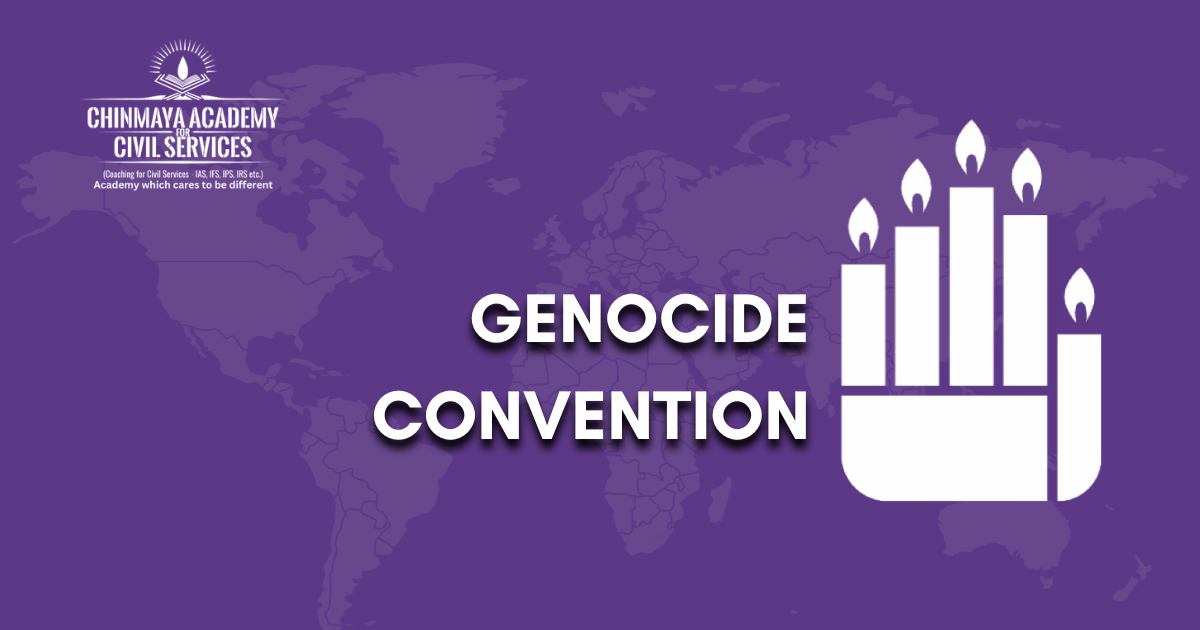
The United Nations Convention on the Prevention and Punishment of the Crime of Genocide, also known as the Genocide Convention, is a landmark agreement – On December 9, 1948, the UN General Assembly adopted the Genocide Convention, the first human rights treaty, in response to the horrific atrocities of the Holocaust. It defines genocide as “acts committed with intent to destroy, in whole or in part, a national, ethnical, racial or religious group, as such.”
- The Genocide Convention states that genocide is a crime that can occur during both times of peace and war.
Why in NEWS
On December 29, 2023, South Africa filed a case against Israel at the International Court of Justice (ICJ). The case alleges that Israel violated its obligations under the 1948 Convention on the Prevention and Punishment of the Crime of Genocide. The convention defines genocide as acts committed with the intent to destroy a national, ethnical, racial, or religious group.
The International Court of Justice (ICJ) is the main judicial organ of the United Nations (UN). It is also known as the World Court.
The Convention outlines specific acts that constitute genocide, including:
- Killing members of the group: This can include mass killings, targeted assassinations, and even allowing members of the group to die from preventable causes.
- Causing serious bodily or mental harm to members of the group: This can encompass physical torture, psychological abuse, and deliberately inflicting conditions of life calculated to bring about physical destruction.
- Deliberately inflicting on the group conditions of life intended to bring about its physical destruction: This could include forced starvation, denial of medical care, or creating hazardous living conditions.
- Imposing measures intended to prevent births within the group: This can involve forced sterilization, abortion, or other measures aimed at reducing the group’s population.
- Forcibly transferring children of the group to another group: This involves severing the cultural and familial ties of children to their own group.
The Convention also establishes an obligation for all member states to:
- Prevent genocide: This includes adopting laws and policies to prohibit and punish genocide, as well as investigating and prosecuting potential perpetrators.
- Punish genocide: This involves bringing individuals responsible for genocide to justice, regardless of where the crime was committed.
- Cooperate with other states in preventing and punishing genocide: This includes sharing information, providing assistance, and coordinating efforts to combat genocide.
The Genocide Convention has played a crucial role in raising awareness of genocide and promoting international cooperation to prevent future atrocities. It has also been used to hold perpetrators accountable and provide some measure of justice to victims and survivors.
ICJ Jurisdiction
- Although every UN member is automatically bound by the ICJ statute, this does not mean that the ICJ has universal jurisdiction over conflicts involving them.
- Only with the agreement of both parties does the ICJ acquire jurisdiction.
- The parties to a case are legally bound by the ICJ’s final ruling.
- The International Court of Justice’s authority is dependent on nations’ willingness to follow its rulings; thus it is unable to guarantee that its orders will be followed.
India’s Ratification
- India ratified the Genocide Convention in 1959, demonstrating its commitment to preventing and punishing this heinous crime.
- However, India also attached a reservation at the time, stating that its acceptance of the Convention’s jurisdiction would be subject to reciprocity, meaning it would only apply to countries that also accepted India’s jurisdiction in similar matters.
 Chinmaya IAS Academy – Current Affairs Chinmaya IAS Academy – Current Affairs
Chinmaya IAS Academy – Current Affairs Chinmaya IAS Academy – Current Affairs
